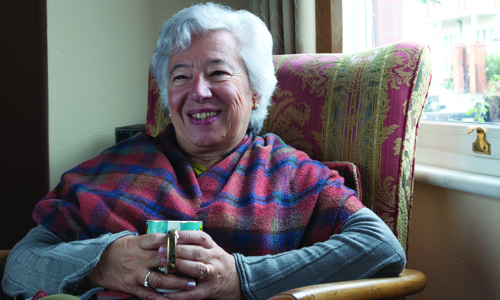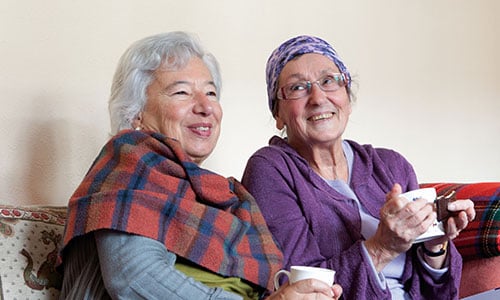Every year, the UN Climate Change Conference – known as COP – prompts critical discussions about reducing carbon emissions, adapting to climate change, and agreeing how countries can work together to finance and deliver these goals. But what everyday steps can older people be continuing to take against climate change?
The climate emergency has felt closer to home in recent years. Many of us will have witnessed first-hand the increasingly extreme weather conditions in the UK, with hotter summers, heavy rain and flooding. And thousands of older people in the UK have experienced terrible damage to their homes through flooding or seen their health deteriorate as a result of extreme weather patterns.
After decades of campaigning on excess winter deaths and the problem of cold homes, Age UK is also keenly aware of the adverse health impacts that overheating can have on people in later life and in recent years we have done far more to support older people to manage in very hot weather.
Half a million older people live in care homes, which often don’t have sufficient ventilation or air conditioning, the risk of overheating in hospitals and care homes is unknown. Older people who are disabled or have limited mobility are particularly vulnerable to floods.
Like many other organisations, Age UK now has no choice but to consider how we are affected by climate change and what we can do to support older people. We also want to help to advise older people about what they can do to minimise their own carbon footprint and take individual action on climate change.
We therefore discussed possible solutions with the team at Friends of the Earth and, together, we have formed these 8 practical suggestions.
1. Insulate your home
If you’re a homeowner, consider whether you can do more to reduce heat loss and cut your bills. Loft insulation usually pays for itself after just 1 year (or 2-3 years if you pay someone to install it). People on low incomes can get support with insulating their homes through the Energy Company Obligation (ECO). You can contact your energy supplier to see if you’re eligible.
2. Install low-carbon heating
Even a well-insulated house needs heating in winter. Switching to the best eco-heating option, a heat pump, can reduce your impact on the climate. It could cut your planet-warming emissions by up to 60%. Air-source heat pumps extract heat from the air outside, heating water for your radiators. They even work when it’s freezing outside, which explains why Sweden uses so many of them. Ground-source heat pumps extract heat from the ground, so require a garden for a trench. They’re more expensive than air-source heat pumps, but also more efficient and quieter. Age UK is calling on the Government to expand grant support for heat pumps for low-income households.
3. Draught-proof your home
Draughty windows, doors and floorboards make homes chilly in winter – wasting heat and increasing your impact on the planet. You'll shave at least £25 off your energy bill when you draught-proof your home. Draught-proofing is straightforward using the Energy Saving Trust's helpful guide. If you’re renting, your landlord may pay for the materials or even get them professionally installed.
4. Develop energy- and water-saving habits
Smart energy meters can help encourage good habits, as they provide live information about how much energy you’re using. You could make an even bigger difference by replacing old, energy-guzzling appliances with efficient versions (A-G rated and above).
We can even make some of our regular habits more energy efficient, such as washing clothes. Wash at lower temperatures, wash full loads, and consider whether you can wear something more than once before you put it in the wash.
Save energy. Pay less
No one wants to spend more on energy than they have to. Read our advice on switching suppliers, cutting costs and handling complaints.
5. Reduce single-use plastic
Single-use plastic is produced from fossil fuels, so its manufacture creates billions of tonnes of greenhouse gases. And it goes without saying that the less plastic we use, the less that ends up in our oceans. The best option is to find alternatives to plastic wherever possible. Start with easy swaps when you go shopping - Friends of the Earth has more information on their website.
6. Plant power
Meat and dairy production accounts for at least 14.5% of global climate-changing gases. While beef and lamb contribute most to direct emissions, chicken and pork production needs vast amounts of soy animal feed, grown in areas cleared of forest in South America. Eating a bit less meat can really help. Start by swapping out half of the meat content in a dish for lentils or veg, which will slash its environmental impact, and boost fibre and nutrient content - a win-win for the planet and our health.
7. Waste less – save more
From growing crops to processing, transporting, selling, storing and throwing away food – everything we eat has an impact on the environment and the climate. Yet about a third of all food produced for human consumption is wasted. Perhaps the easiest way to waste less is to plan meals before you shop, get creative with leftovers, and if you still have waste, compost it if you can.
Grow your own food
If you'd like to spend more time outdoors and maintain a healthier diet, have a read of our tips on how to start your own kitchen garden.
8. Bank and invest ethically
Many large banks could be using your money to invest in climate-wrecking fossil fuel projects. Switch to an ethical bank or ethical financial product. Research to see what banks, building societies and investment firms offer ethical products, and any that fund sustainable initiatives including renewable energy. Ask your pension provider where they invest your money and consider switching to an ethically invested fund, which most pension providers will have. See ShareAction’s guide on how to switch your pension.
Friends of the Earth
Head to the Friends of the Earth website for more information, tips and resourcs on how to reduce your carbon footprint.





